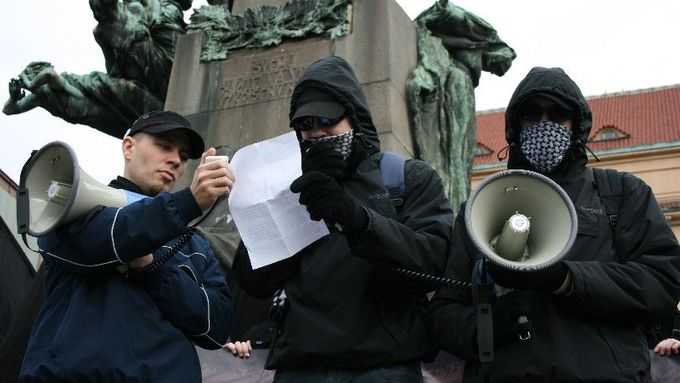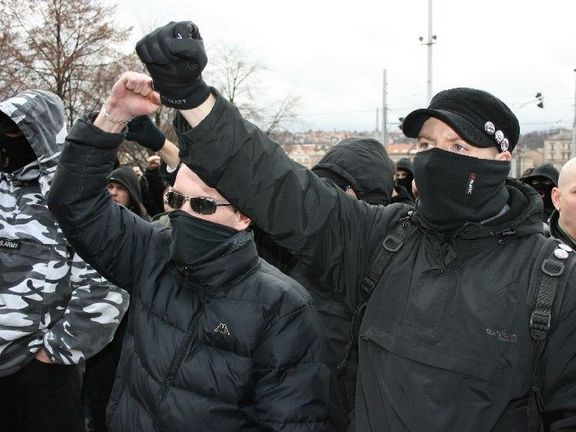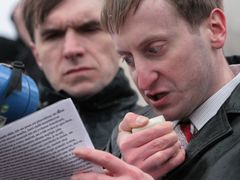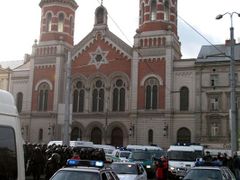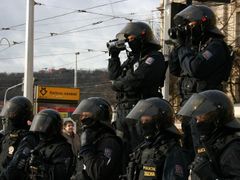Prague - Black combat boots stomp against the cobblestones, and a shadowy figure emerges from the darkness. The well-polished leather on his feet and the bare skin on his head are illuminated by the neon signs lining Wenceslas Square.
The stomping of his boots quickens. Stomp.Stomp. Pound, pound, pound. Is he running at us or merely towards us? He raises his fist towards the sky and pumps it in the air. "Skinheads unite!" he shouts, jeering at us, his teeth showing in a twisted sort of smile. And with those two words, he disappears again around the corner.
"Just some drunk," I mutter to my friend. Looking at her, however, I know it isn't true. Like me, she has long, wavy, black hair. Like me, she has olive skin and decidedly "ethnic" features. I look at her and see what he sees--the Roma, the Hispanic, the Jew, the Arab, the unwanted other.
Since that night on Wenceslas Square, he has followed me around Prague. I see him in the man with camouflage pants or bomber jacket or shaved head. I see him on the tram and in the streets. But is he--the skinhead, the racist, the neo-Nazi--really all around me?
There is no evidence that the movement has recently grown in numbers. In fact, the official count of neo-Nazi events has actually declined in recent years; in 2004, the Czech police organized crime unit reported 33 neo-Nazi gatherings and concerts, and in 2006, that number dropped to 18.
The difference in exposure now, however, is just how they are gathering in comparison to a few years ago. Now, as in 1990s, they march openly in cities like Plzen and Prague. But today they also infiltrate Internet chat rooms, make contacts with right-wing extremists in neighboring countries, and pose as vigilantes against crime.
They are organizing their still relatively small numbers into a smarter, craftier political entity in an effort to force themselves into the public consciousness.
"They are trying to present themselves as the force of law and order," says Miroslav Mares, Czech neo-Nazi expert and political science professor at Masaryk University. "They hope to address the broader
political spectrum in the next elections."
At their marches, they claim to be nothing more than nationalists, the only ones who will fight to uphold the identity and integrity of the Czech nation. "Our only duty is to continue in our fight by defeating this rotten liberal regime with its own weapons-in the elections," said Tomas Vandas, head of the Workers Party, at a neo-Nazi march in Plzen on March 1, 2008.
Propagating outright Nazi ideology would be breaking Czech law, so they skirt around it. Prague, for example, struck down their request to march through the Jewish quarter on November 10, 2007, the 69-year-anniversary of Kristallnacht, yet they tried to gather there anyway, claiming to be protesting the Czech Republic's involvement in the Iraq War.
The Czech police managed to keep hundreds of skinheads from coming into the city, a move praised by anti-racism groups.
A few hundred neo-Nazis were able to gather in Plzen on January 19, 2008, the anniversary of the first transports of local Jews to Nazi concentration camps. The Plzen mayor banned the march, but they appealed to the courts and succeeded in demonstrating on March 1, protesting the infringement of their freedom of speech rights.
"The movement is more emboldened now in terms of coming out in public for demonstrations and arguing for freedom of speech," Gwendolyn Albert, human rights advocate and author of the 2006 European Network Against Racism report on racism in the Czech Republic, said in a phone interview.
"They are selecting dates for marches that are of extreme significance to the Holocaust with no other intention but to offend. This kind of targeting of Holocaust sensitive topics, trying to offend people and win supporters, this way is new."
But is it working? How does mainstream Czech society react to these recent displays of neo-Nazi activity? At the March 1 rally in Plzen, neo-Nazi opponents outnumbered the demonstrators by the hundreds, although many of these counter-protestors, anarchists and anti-fascists, were extremists in their own right.
The Plzen Jewish Community organization, meanwhile, has booked up all possible demonstration dates from March to July to prevent the neo-Nazis from marching again in the coming months.
"This is exactly how it all started in Nazi Germany," Eva Stixova, the head of the Plzen Jewish Community said by phone. "They started marching and heiling, then came transports and that was it.
Back then nobody stood up to them because they were afraid. Now we can't be indifferent."
While the reaction of minority community organizations as well as that of opposing political movements has been swift and strong, Albert, an American, thinks there's danger in the way that average Czechs passively view the neo-Nazi movement.
"There is a real desire for Czechs to keep the Czech Republic for themselves," said Albert, "but the rest of the world is coming through here at 100 miles per hour."
According to Albert, Czech citizens are resisting what they perceive as the physical and cultural encroachment of outsiders into their space as they struggle to forge a sense of national identity.
After 50 years under communist rule, Czechs are now being thrown head-first into a multi-cultural environment. In the midst of a rapid transition to a market economy, a surge in tourism and inclusion in the European Union, time for adjustment has been scarce.
"This part of the world is still undergoing a reevaluation of what the Holocaust meant and how to deal with it," says Albert, "Under communist rule, we weren't able to discuss it and deal with it, and now after a 50-year gap, we are facing a new era without coming to terms with the past."
Now some fear that the neo-Nazi movement is taking advantage of this decades-old dearth in communication and manipulating Czech society's suspicion of outsiders to benefit their extremist cause.
Mares says the members of the movement are being particularly strategic in using negative attitudes towards the Roma population to gain support in the mainstream environment.
Neo-Nazis are forming groups of vigilantes called "national guards" to protect against crime in Roma areas, but actually intend simply to persecute the residents.
"They are counting on the ethno-ization of social problems, and, thereby they are trying to create the notion that crime is a Roma problem," said Mares.
"That's what their goal is, and it's a fact that it's finding a willing ear among the public, and not just among the lower classes. These notions can become established even among the elite."
Despite these recent gains for the neo-Nazi movement, support is still extremely limited, but that doesn't make their cause--the propagation of hate--any less threatening. That's one reason why Czech non-governmental organizations like People in Need support anti-extremism programs in schools across the country.
For instance, "Neo-Nazi. Do You Want Him?," is a new ad campaign designed by People in Need to show young people what is really behind the behavior of hate groups masked as defenders of Czech honor.
Meanwhile, it is worth noting that Czechs in numerous surveys have in majority displayed great antipathy for the some 5,000 neo-Nazis active in a country of 10.2 million.
It's also important for Americans to understand that while demonstrating with a Swastika, publishing Hitler's Mein Kampf or giving the heil Hilter salute is legal in the U.S., any open displays of Nazism in Europe are generally criminal offenses.
But the wrinkle is that according to polls, most Czechs say they would not want to live next to a Roma, or gypsy, and the risk of clever extremists eliciting sympathy is as real as the black-booted xenophobe on Wenceslas Square.
This story was orginally published by the Prague Wanderer, a web-zine run by New York University students in Prague, Czech Republic.
Aisha Gawad is a third year student at New York University studying journalism and Middle East and Islamic Studies. She is from Burke, Virginia.
